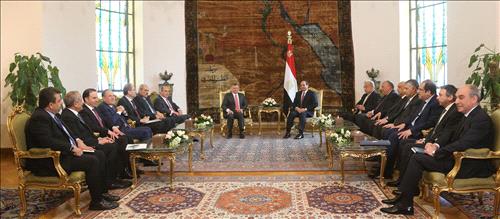Ammon News - AMMONNEWS - His Majesty King Abdullah II and Egyptian president Abdel Fattah Al-Sisi held a summit meeting in Cairo on prospects for boosting Jordanian-Egyptian ties and current regional developments.
During a one-on-one encounter at Al Ittihadiyah Palace followed by an expanded session attended by top officials on both sides, the leaders discussed mechanisms to enhance and solidify relations and expand joint cooperation, particularly in economic fields.
They emphasised the need to build on the outcome of a meeting of the Joint Jordanian-Egyptian Higher Committee, which was held in Cairo last year, and reactivate signed agreements and memoranda of understanding in trade, service, investment and tourism sectors.
The King and Sisi said they looked forward to an upcoming meeting of the higher committee in Amman this year to come up with more partnerships to serve the common interests of the two countries.
They also stressed their keen interest to maintain coordination and consultation on challenges facing the region "in a manner to serve pan-Arab issues and achieve security and stability".
Also up for discussion was an Arab summit that Jordan will host late next month, and the leaders were unanimous on the importance of holding the annual summit in view of the crises the region is witnessing that require fostering joint Arab action and unifying positions to reach political solutions to these problems.
King Abdullah stressed Egypt's pivotal role in serving Arab causes and enhancing Arab solidarity.
Also high on the agenda were regional developments, foremost of which were the Syrian crisis, the Middle East peace process, Jerusalem, and the war on terrorism.
The leaders stressed that efforts to kickstart serious and effective peace talks between the Palestinians and Israelis should be based on the two-state solution as the only solution to the conflict. Any proposals not based on two-state and international legitimacy resolutions, they warned, would have serious repercussions on the entire region.
Regarding Jerusalem, the leaders stressed the importance of maintaining the historic status quo in the holy city, and warned that any attempt to undermine it would have ramifications on the region's security and stability.
His Majesty reiterated that Jordan, through the Hashemite custodianship of the holy sites in Jerusalem, will continue its role at international forums to protect the Islamic and Christian holy shrines in the city, support the steadfastness of its people and safeguard the Arab identity of the holy city.
They also said that efforts should be stepped up to find political solutions to other pressing regional issues, namely the Syrian crisis, and agreed on the need to build on the recent Astana meetings to consolidate a Syria ceasefire towards finding a political solution within the Geneva negotiating track.
On Iraq, His Majesty and president Sisi reaffirmed their support of the military operation to liberate the city of Mosul as well as national reconciliation efforts in the country.
They also discussed Libya and underlined efforts to unify the country, build national institutions and boost security and stability in the country.
The talks also focused on the need to intensify regional and international efforts to fight terrorism within a holistic approach as it threatens regional and global peace and security.
The leaders also talked about the King's recent trip to Washington and his talks with US administration and congressional leaders on finding political solutions to Middle East crises and achieving regional peace and security.
President Sisi stressed the historic brotherly relations between Jordan and Egypt and pointed to the two countries' interest to further enhance cooperation, lauding Jordan's support for Arab causes and the King's endeavours to unify Arab ranks and find solutions to regional crises.
The Egyptian leaders held a lunch banquet in honour of the King and the accompanying delegation.
Attending the talks on the Jordanian side were the prime minister, Royal Court chief, the foreign minister, the King's national security adviser, director of general intelligence, and the King's adviser and the rapporteur of the National Policies Council. Senior Egyptian officials were also in attendance, including the prime minister, the intelligence chief and the director of the president's office.
King Abdullah was accorded an official reception upon his arrival at the presidential palace for the talks.
